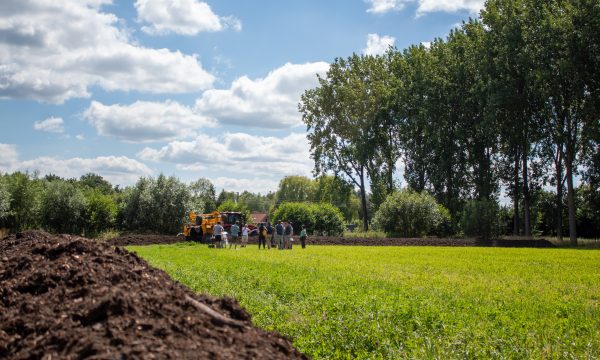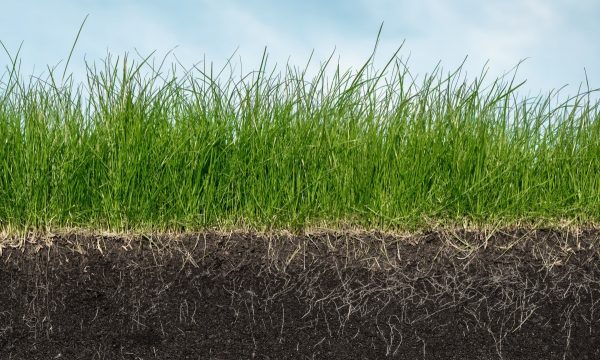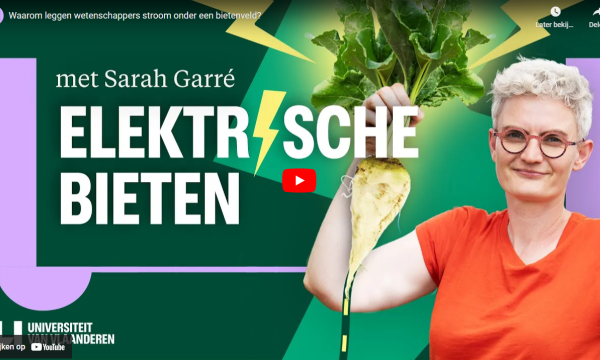Press release How can we scale up carbon farming in Flanders?
To get carbon farming scaled up in Flanders, the creation of a steering public-private partnership body may be the best idea. This is what ILVO and the Department of Agriculture and Fisheries conclude in a comprehensive roadmap study. The roadmap 'scaling up carbon agriculture' is the final result of the LIFE CarbonCounts project, a project in which 7 groups of stakeholders consulted: policy makers, researchers, civil society organizations, agricultural companies and organizations, advisory services and also private companies already active in the voluntary carbon market. In the future cooperation structure, the participants see the need for three sub-networks, each with its own functions, action points and actors.
Carbon farming aims to sequester carbon (the C from CO2) in the soil or woody biomass for a longer period of time as a means of climate mitigation and to ensure that carbon already sequestered remains sequestered. This requires certain cultivation practices such as growing perennial crops, crops with intensive rooting and green cover, agroforestry and/or the application of stable organic manure or compost.
HOW to concretely value these practices, and how to organize the revenue model and actually scale up to a broad win-win system for farmer, society and climate, was and still remains the big question.On March 30, 2023 ILVO and the Department of Agriculture and Fisheries are organizing an interesting (English-language) webinar on this subject. The roadmap to carbon agriculture in Flanders will be explained and experts from Finland, the Netherlands, France, Italy and Denmark will discuss their local experiences with a voluntary carbon market and their (guiding/advising) partnerships.
Meanwhile, the Department of Agriculture and Fisheries has made considerable progress with the so-called Soil Passport and the Carbon Tool available in it. That tool clarifies in a convenient, automated way the individual farmer's options for increasing carbon sequestration on his plots.
Roadmap outlines starting point and steps to rollout in practice
ILVO and Department of Agriculture & Fisheries stepped together into the LIFE CarbonCounts research project, funded by the Climate Fund and by EU, to chart a course for scaling up carbon farming. In a system analysis (ILVO report D/2022/08) the different components of revenue models for carbon agriculture were clarified, as well as the roles that different stakeholders can take on in this process. Based on this situational picture the roadmap was drawn together with the actors involved, say the track that can lead to performant, sustainable, locally adapted systems of carbon agriculture, in line with the objectives. A key element is the designation of an organization with the mandate and resources to coordinate this and the creation of a public-private collaboration structure.
This public-private partnership structure will distinguish three networks that are complementary to each other.
(1) The "navigation network," in which all parties (government, farmers, researchers, society and private companies) are represented. Among other things, the network aims to connect the stakeholders in Flanders so that they can exchange knowledge, views and experiences, work together on a narrative for carbon agriculture and jointly look for solutions to detected bottlenecks for the practical rollout of carbon agriculture in Flanders
(2) The 'MRV network' in which to collaborate on a common knowledge base for reliable and cost-efficient monitoring of carbon sequestration without major administrative burden for farmers. (MRV - read: measuring, reporting, verifying carbon agriculture) Here the roadmap sees a role for agricultural organizations, advisory services policy and research.(3) The 'financing network' ensures, among other things, that earning models for carbon agriculture remain financially interesting for farmers and investigates how profits and risks get distributed fairly in a sustainable earning model for farmers and paying companies. Three stakeholder groups (agricultural organizations, policy and private organizations and companies active in the voluntary carbon market) are involved.
Soil passport and Carbon Tool
The soil passport is a digital tool in which farmers can find information about the soil on their fields in an orderly manner, based on data from various public data sources. Farmers can also make their own data from e.g. soil samples visible via the data sharing platform DjustConnect.
The Carbon Tool (Koolstoftool) was developed during the LIFE CarbonCounts project and is based on the already existing Demeter tool (co-developed by a.o. VLM, UGent and Departement Omgeving). The data collected in the soil passport at plot level can be used in the CarbonCounts tool to calculate the expected evolution of the carbon content in the building stock, taking into account a.o. the known crop rotation and soil texture of the plot. 'The farmer does not have to provide any additional information and input and still gets an idea about the expected carbon content of the building soil of his plot. Moreover, he can create a number of alternative scenarios on each plot where e.g. the crop rotation can be adjusted. The different scenarios are mutually comparable and help to make a carbon-building decision around crop plan and rotation, among other things.'
The Carbon Tool also allows calculation of carbon storage in woody elements, say isolated trees or tree rows or woody borders and/or hedges, and this both on plots and at the edge of plots. The localization of trees and woody elements is done through aerial photography and artificial intelligence. In one move, the identification of the type of woody element is done, and the approximate crown area is determined, followed by a rough estimate of carbon storage. If data such as tree age, trunk diameter and/or height are known, they can make the estimates more precise (via the CARAT tool, available from agroforestry Flanders).
The soil passport and the Carbon tool are currently still under development. They will become available to farmers through the LV e-counter in 2023.
Webinar tests European carbon farming recipes against brand-new Flemish roadmap
More than 150 people registered for the online event of 30 March 2023 organized by ILVO and Department of Agriculture and Fisheries, with support from EJP Soil (EU). The ILVO website contains the program and the names of the international experts.
"The roadmap is policy-preparing research to outline the working field for policy on carbon agriculture within Flanders. It formulates a need for cooperation between policy, private actors and research. The recent European framework proposal on criteria such as quantifiability, additionality, long-term storage in the soil and sustainability can still be taken into consideration by the researchers," said Flemish Minister for Agriculture Jo Brouns recently to the Parliamentary Commission for Agriculture.
According to the project partners, this roadmap provides handles for a cooperation and regulatory framework at the Flemish level. There are now well-founded signposts to facilitate the successful rollout in the coming years. All parties involved can seize opportunities from carbon agriculture for a joint win-win.


